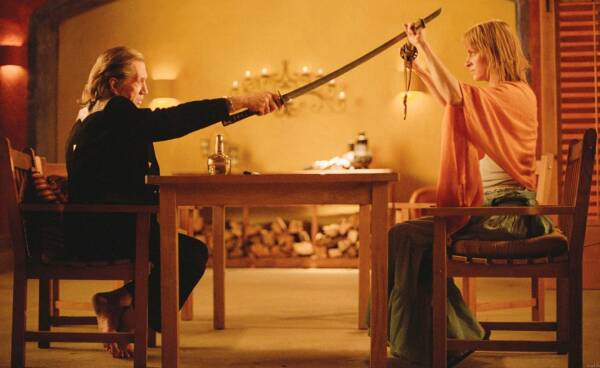 ★★★★
★★★★
“And she’s not Kiddo-ing…”
 Let’s be blunt: Kill Bill would probably have been a better movie, if the Weinsteins had told Tarantino, “No: you can not cut this into two – you’re going to have to edit it down like every other director.” The second section of the film is notably less strong than the first, its 135 minutes containing too much stuff which a better, less self-indulgent moviemaker would realise was superfluous and chop out.
Let’s be blunt: Kill Bill would probably have been a better movie, if the Weinsteins had told Tarantino, “No: you can not cut this into two – you’re going to have to edit it down like every other director.” The second section of the film is notably less strong than the first, its 135 minutes containing too much stuff which a better, less self-indulgent moviemaker would realise was superfluous and chop out.
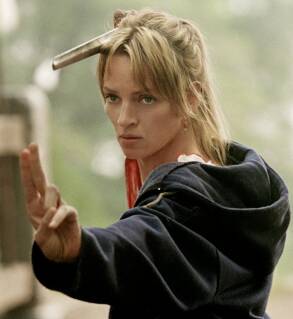 Precisely what, I’ll get to in a minute. But I also have to say that when this film works, it does so extremely well, with moments – and a good number of more lengthy sequences – that are just about perfect. We learn why Elle Driver (Hannah) has only one eye; the relationship between Budd (Madsen) and Bill (Carradine); the reason the Bride quit her life as an international jet-setting killer; and how the Crazy 88’s didn’t actually have 88 members. All these elements are dealt with swiftly and efficiently, plugged in like jigsaw pieces in their correct place, so it’s not as if Tarantino can’t do the right thing.
Precisely what, I’ll get to in a minute. But I also have to say that when this film works, it does so extremely well, with moments – and a good number of more lengthy sequences – that are just about perfect. We learn why Elle Driver (Hannah) has only one eye; the relationship between Budd (Madsen) and Bill (Carradine); the reason the Bride quit her life as an international jet-setting killer; and how the Crazy 88’s didn’t actually have 88 members. All these elements are dealt with swiftly and efficiently, plugged in like jigsaw pieces in their correct place, so it’s not as if Tarantino can’t do the right thing.
The film is at its best in the middle, from when Beatrix Kiddo (Thurmann – her character’s name is revealed, making the bleeping-out in the first part seem like nothing more than a childish prank at the audience’s expense) takes a shotgun blast to the chest from Budd, on through a flashback to a training sequence with a kung-fu master (the wonderful Gordon Liu), Beatrix’s ‘resurrection’ and up to and including a brawl with Elle that is probably the most brutal woman-woman combat ever filmed by Hollywood.
But this is not the action-fest of part one; and more’s the pity, I would say. In fact, the Bride only actually kills one person in this film [since we go in expecting her to dispose of Budd, Elle and Bill, this should whet your appetite more than it counts as a spoiler] Save her fight with Elle, there is nothing that comes within a mile of the House of Blue Leaves battle which ended the first movie. This renders the two together as possessing an uneven tone, since that massacre is the climax of the combined stories told in Kill Bill 1+2, on just about every level of cinema. Tarantino would have been better off getting his spaghetti Western influences out there before the kung-fu ones.
Tarantino’s lust for rubbing chunks of pop culture in our face rears its ugly head early on, with Bill playing a flute, just as Carradine did in his Kung Fu days. It’s a pointless anachronism, which doesn’t fit the character, and is topped only at the end when Bill rambles on, pontificating about the symbolism of Superman and how it relates to Beatrix. I can see the lines spewing forth from Quentin’s smug mouth, or even Kevin Smith’s; coming out of Bill’s, they seem absurdly forced and artificial.
 But when Tarantino just nods to other movies, rather than waving them in the air and shouting “Look at me! Amn’t I clever?”, it works – sometimes sublimely. Beatrix professes her love to Bill, saying she’d ride a motorcycle onto a speeding train for him, likely a reference to Michelle Yeoh’s amazing stunt in Supercop. It succeeds, because it’s such an effective image, you don’t need to know the details; if you do, it merely lends them extra resonance. Similarly, at the end, when Beatrix and her daughter are re-united, the latter wants to watch Shogun Assassin; her father demurs…because it’s “too long”. [If you don’t get that joke, Shogun was one of the most arterial movies ever released…up until KB 1, anyway]
But when Tarantino just nods to other movies, rather than waving them in the air and shouting “Look at me! Amn’t I clever?”, it works – sometimes sublimely. Beatrix professes her love to Bill, saying she’d ride a motorcycle onto a speeding train for him, likely a reference to Michelle Yeoh’s amazing stunt in Supercop. It succeeds, because it’s such an effective image, you don’t need to know the details; if you do, it merely lends them extra resonance. Similarly, at the end, when Beatrix and her daughter are re-united, the latter wants to watch Shogun Assassin; her father demurs…because it’s “too long”. [If you don’t get that joke, Shogun was one of the most arterial movies ever released…up until KB 1, anyway]
Unfortunately, Tarantino then subjects us to lengthy footage of mom and little girl watching the film, another pointless indulgence. But generally, it’s when characters open their mouths that the film hits trouble; there’s hardly two lines of dialogue which could not be, and probably should have been, compacted into one. Whole scenes cry for removal, such as Budd’s day job, which tells us nothing about him that his habit of drinking from jars doesn’t say, more efficiently and cinematically. And if I wanted to learn the precise volume of Black Mamba venom injected per bite, I’d tune to the Discovery Channel.
The deluxe box set, with both movies and a host of extra footage is, undoubtedly inevitable, which is why I haven’t bothered with the initial release of Volume 1, and nor will I bother with Volume 2. When it arrives, I will be sorely tempted to take everything and produce a proper edit, running two hours or less, which will have everything we need and none of the dreck. Instead, for the moment, you have one extremely good film and one pretty good film. Under normal circumstances, I’d take that from Hollywood in a heartbeat. But when, with a little care, this could have been the finest action heroine movie of all time, I must admit to a little disappointment.
Dir: Quentin Tarantino
Stars: Uma Thurman, David Carradine, Daryl Hannah, Michael Madsen

















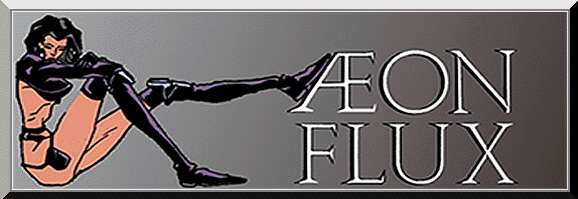
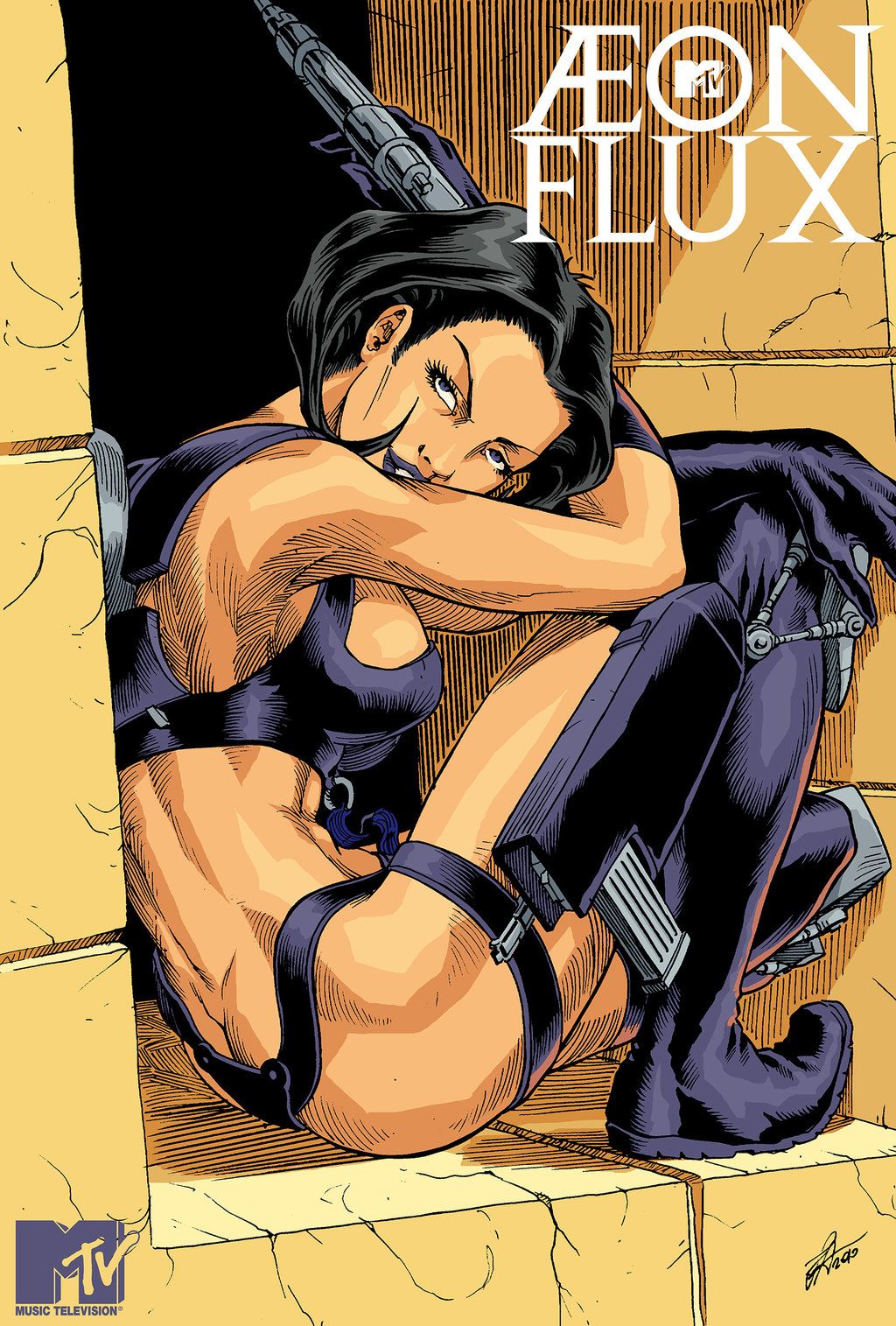


 While one might question Pam’s acting talents, she is backed by a sterling cast of character actors: Steve Railsback, Xander Berkeley, Clint Howard, Udo Kier and Temuera Morrison. Each one hits the mark in their role, delivering lines with the correct level of enthusiasm. Kier, as usual, steals the show (his presence definitely helped soothe Chris’s eye-rolling), though Berkeley’s sleazy cop is perhaps the biggest surprise, especially if you’re only familiar with him as Jack Bauer’s boss in the first two seasons of 24.
While one might question Pam’s acting talents, she is backed by a sterling cast of character actors: Steve Railsback, Xander Berkeley, Clint Howard, Udo Kier and Temuera Morrison. Each one hits the mark in their role, delivering lines with the correct level of enthusiasm. Kier, as usual, steals the show (his presence definitely helped soothe Chris’s eye-rolling), though Berkeley’s sleazy cop is perhaps the biggest surprise, especially if you’re only familiar with him as Jack Bauer’s boss in the first two seasons of 24. I admit, you could argue the entire story is irrelevant, and this is nothing more than an indefensible cocktail of eroticized violence. But those who live in such a moral vacuum as to require Hollywood to fill in the gaps, have got much bigger problems than Pamela Anderson’s breasts. If you can get past the first five minutes (which even I will say seem a lot longer), there’s no denying the effort expended here – albeit mostly on sex and violence, aimed at the lizard section of the viewer’s brain.
I admit, you could argue the entire story is irrelevant, and this is nothing more than an indefensible cocktail of eroticized violence. But those who live in such a moral vacuum as to require Hollywood to fill in the gaps, have got much bigger problems than Pamela Anderson’s breasts. If you can get past the first five minutes (which even I will say seem a lot longer), there’s no denying the effort expended here – albeit mostly on sex and violence, aimed at the lizard section of the viewer’s brain.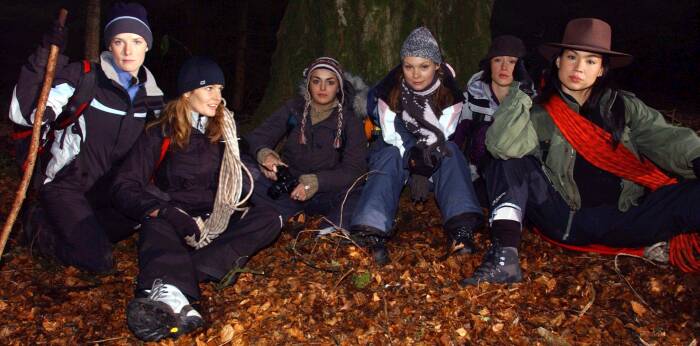
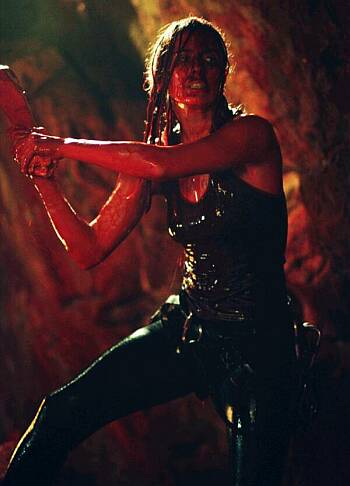 Simplicity is under-rated, especially when it comes to genre films. The simplest horror movies often work the best, because they prey on widely-held fears: monsters (Jaws), getting lost (The Blair Witch Project) or claustrophobia (Below). And now, we get The Descent, which combines all three into one ball of nerves, pitting six female cave-explorers against
Simplicity is under-rated, especially when it comes to genre films. The simplest horror movies often work the best, because they prey on widely-held fears: monsters (Jaws), getting lost (The Blair Witch Project) or claustrophobia (Below). And now, we get The Descent, which combines all three into one ball of nerves, pitting six female cave-explorers against  The focus of the film is Juno and Sarah, with the rest of the cast largely reduced to cannon-fodder – though not badly-drawn cannon-fodder, I must admit. Juno is a near-Amazon, while Sarah has to become one, simply in order to survive, and that’s about the extent of the character development here. Demureness, beauty, the ability to bear babies, and all other typical “feminine” traits, are of absolutely no use whatsoever. The ability to drive your pick-axe, repeatedly, into the head of pissed-off Gollum wannabes, on the other hand… Yeah, that
The focus of the film is Juno and Sarah, with the rest of the cast largely reduced to cannon-fodder – though not badly-drawn cannon-fodder, I must admit. Juno is a near-Amazon, while Sarah has to become one, simply in order to survive, and that’s about the extent of the character development here. Demureness, beauty, the ability to bear babies, and all other typical “feminine” traits, are of absolutely no use whatsoever. The ability to drive your pick-axe, repeatedly, into the head of pissed-off Gollum wannabes, on the other hand… Yeah, that  The same source comic inspired Lady Snowblood, but plenty of original thought has also been put into this, set in an interesting alternate present, after 500 years of imposed isolation. A band of fighters, the Takemikazuchi, have been thrown out of work and now roam the country, killing for pay. One of their number, Yuki (Shaku), discovers their leader (Shimoda) killed her mother, and after confronting him, leaves. Except the group’s motto seems to be, “No one here gets out alive”… She finds shelter with Takashi (Ito) – except he is part of a rebel group with a similar philosophy, so a quiet, peaceful life is not on the cards for either of them.
The same source comic inspired Lady Snowblood, but plenty of original thought has also been put into this, set in an interesting alternate present, after 500 years of imposed isolation. A band of fighters, the Takemikazuchi, have been thrown out of work and now roam the country, killing for pay. One of their number, Yuki (Shaku), discovers their leader (Shimoda) killed her mother, and after confronting him, leaves. Except the group’s motto seems to be, “No one here gets out alive”… She finds shelter with Takashi (Ito) – except he is part of a rebel group with a similar philosophy, so a quiet, peaceful life is not on the cards for either of them.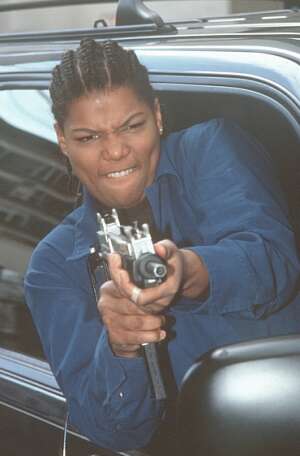 After a couple of less-than-perfect entries in the ‘robbery girls’ subgenre, this came as a refreshing blast, with decent characterisation and a storyline that goes past the painfully obvious. Mind you, the moral remains the same – crime doesn’t pay – but at least the road taken to get there is interesting and complex. These women all have their own reasons for wanting to rob banks: getting back at society for perceived injustice, supporting a child, or simply for kicks. Interestingly, you can see both their point of view and society’s, the latter most clearly in a surprisingly sympathetic cop, Strode (John C. McGinley). The results are more a product of tragic circumstance than anything else.
After a couple of less-than-perfect entries in the ‘robbery girls’ subgenre, this came as a refreshing blast, with decent characterisation and a storyline that goes past the painfully obvious. Mind you, the moral remains the same – crime doesn’t pay – but at least the road taken to get there is interesting and complex. These women all have their own reasons for wanting to rob banks: getting back at society for perceived injustice, supporting a child, or simply for kicks. Interestingly, you can see both their point of view and society’s, the latter most clearly in a surprisingly sympathetic cop, Strode (John C. McGinley). The results are more a product of tragic circumstance than anything else.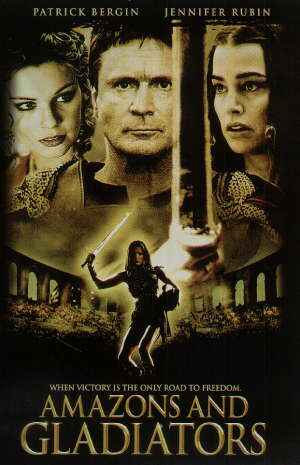 Benefiting from a slew of decent performances, A&G manages to surpass most of the competition and become a worthy entry in the “gladiatrix” sub-genre. This is perhaps because the cast have been hired either because they can act or because they can fight, while simultaneously not embarrassing themselves in the other department. Pity poor Hiltz, who is in virtually every scene, yet doesn’t even get her name on the cover.
Benefiting from a slew of decent performances, A&G manages to surpass most of the competition and become a worthy entry in the “gladiatrix” sub-genre. This is perhaps because the cast have been hired either because they can act or because they can fight, while simultaneously not embarrassing themselves in the other department. Pity poor Hiltz, who is in virtually every scene, yet doesn’t even get her name on the cover.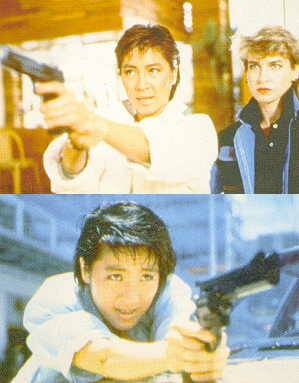 Purely on a historical level, this 1985 film merits attention since it started the whole action-heroine genre in Hong Kong cinema, which thrived for the next decade, producing some of the finest entries ever made. It also was, effectively, the start of the careers of Michelle Yeoh and Cynthia Rothrock. Interesting to see how they’ve since headed in opposite directions: Rothrock to low-budget erotic thrillers, Yeoh to the Academy Awards.
Purely on a historical level, this 1985 film merits attention since it started the whole action-heroine genre in Hong Kong cinema, which thrived for the next decade, producing some of the finest entries ever made. It also was, effectively, the start of the careers of Michelle Yeoh and Cynthia Rothrock. Interesting to see how they’ve since headed in opposite directions: Rothrock to low-budget erotic thrillers, Yeoh to the Academy Awards. Women-in-prison is not a genre greatly within our remit, since they’re often just an excuse for a bit of soft-core masochism. There are occasional exceptions, however, and this is one, with its origins as a network TV show forcing restraint of the more exploitative aspects, as well as permitting the characters to develop more fully than in a movie.
Women-in-prison is not a genre greatly within our remit, since they’re often just an excuse for a bit of soft-core masochism. There are occasional exceptions, however, and this is one, with its origins as a network TV show forcing restraint of the more exploitative aspects, as well as permitting the characters to develop more fully than in a movie.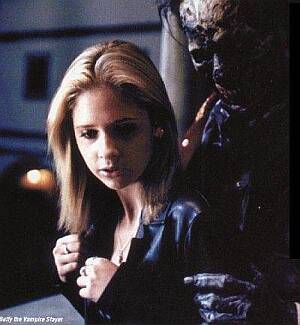 While there have been stand-out Buffy episodes since, season two perhaps ranks as the most consistently high in quality. There’s hardly an episode that ranks as less than excellent, and the writing is sparklingly witty, with more eminently quotable lines than you can shake a stake at.
While there have been stand-out Buffy episodes since, season two perhaps ranks as the most consistently high in quality. There’s hardly an episode that ranks as less than excellent, and the writing is sparklingly witty, with more eminently quotable lines than you can shake a stake at.